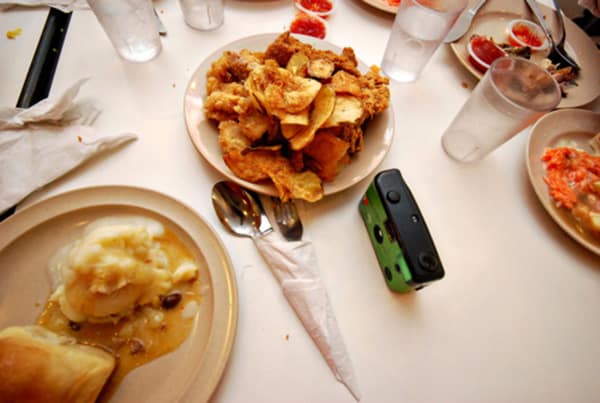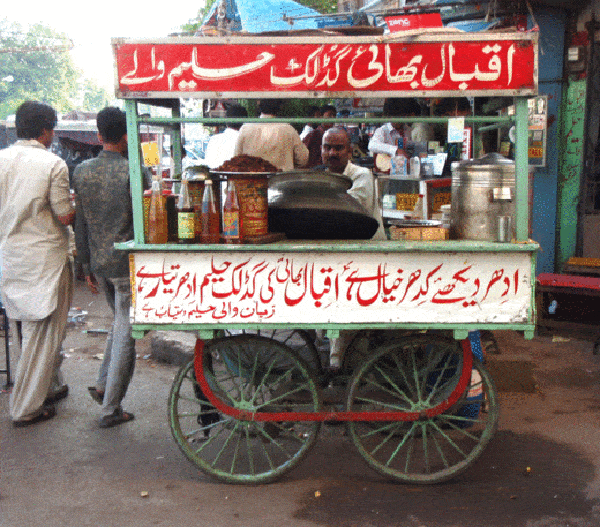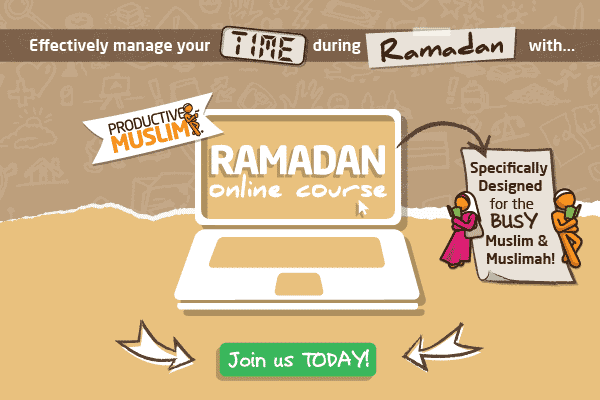

Then is the case of iftar parties, those who claim first strike and those given in retaliation; do unto others what they did unto you. Yeah! I know that is poetic license but all is fair in iftar and war. And the conversations before, during and after the iftar party. Gossip galore. What to say about the political iftars that people vie to be invited to so that they can rub shoulders with those who ‘count’?
I shall pass by in silence looking at our women and servants slaving in kitchens, cooking food for those who don’t need it and sacrificing their own time of dhikr and dua because the pleasure of their bosses is more important than the pleasure of Allah  . Or should I say that the displeasure of their bosses is more visible and immediate than the displeasure of Allah
. Or should I say that the displeasure of their bosses is more visible and immediate than the displeasure of Allah  .
.
Ask our business people and they will tell you that 70% of their business happens after iftar in Ramadan, especially during the last ten nights. And of course as you shop you need sustenance and so you eat. Shops are very accommodative and so they remain open all through the night. And the nights of grace and mercy pass unnoticed overhead.
I believe the title of this article truly reflects our reality: that Ramadan is a time of self-indulgence for us, instead of being a time of self-denial, reflection, introspection and repentance.
The purpose of Ramadan
Allah  ordered us to have His taqwa, to fear His displeasure and be aware of the fact that one day we will meet Him, when He
ordered us to have His taqwa, to fear His displeasure and be aware of the fact that one day we will meet Him, when He  said:
said:
“O you who have believed, fear Allah as He should be feared and do not die except as Muslims [in submission to Him].” [Qur’an: Chapter 3, Verse 102]
Allah  told us that He made fasting fardh (compulsory) upon us so that we can develop taqwa. But does that happen to us in Ramadan? Do we really develop more taqwa? Is this reflected in our lives? And if not, is Ramadan anything more for us than a date change? Perhaps a social event at best; an enjoyable time but nothing more in terms of the blessings that it comes with for the one who has wisdom.
told us that He made fasting fardh (compulsory) upon us so that we can develop taqwa. But does that happen to us in Ramadan? Do we really develop more taqwa? Is this reflected in our lives? And if not, is Ramadan anything more for us than a date change? Perhaps a social event at best; an enjoyable time but nothing more in terms of the blessings that it comes with for the one who has wisdom.
Allah
said:
“O you who have believed, decreed upon you is fasting as it was decreed upon those before you that you may become righteous.” [Qur’an: Chapter 2, Verse 183]
As we can see, Allah  ordered us to have taqwa and then showed us how to develop taqwa: by fasting. Only once a Muslim develops taqwa, can his submission to Allah
ordered us to have taqwa and then showed us how to develop taqwa: by fasting. Only once a Muslim develops taqwa, can his submission to Allah  be assured and so the second part of the ayah becomes possible:
be assured and so the second part of the ayah becomes possible:
“…do not die except as Muslims [in submission to Him].” [Qur’an: Chapter 3, Verse 102]
A month of increasing in obedience
The secret of obedience is to obey without question. It is not obedience without understanding. The understanding when obeying Allah  is to understand who Allah
is to understand who Allah  is, not what the command is or the logic behind it. This is a major trap that most of our so-called intellectuals fall into. They get lost in trying to understand the logic of the command and forget who is commanding it. That is why Ramadan comes to emphasize the fact that the Muslim obeys because Allah
is, not what the command is or the logic behind it. This is a major trap that most of our so-called intellectuals fall into. They get lost in trying to understand the logic of the command and forget who is commanding it. That is why Ramadan comes to emphasize the fact that the Muslim obeys because Allah  commanded it, not because it makes ‘sense’ to him. Allah
commanded it, not because it makes ‘sense’ to him. Allah  made some things halal and some things haram. But in Ramadan during the hours of daylight, He
made some things halal and some things haram. But in Ramadan during the hours of daylight, He  made even the things which are ordinarily halal, haram. When the Muslim obeys Allah
made even the things which are ordinarily halal, haram. When the Muslim obeys Allah  and fasts he is essentially doing something which makes sense only when one he understands whose command it is. It is emphasized for the Muslim that if he obeyed Allah
and fasts he is essentially doing something which makes sense only when one he understands whose command it is. It is emphasized for the Muslim that if he obeyed Allah  during Ramadan and stayed away even from halal then how much more important it is for him to stay away from what Allah
during Ramadan and stayed away even from halal then how much more important it is for him to stay away from what Allah  prohibited and made haram?
prohibited and made haram?
That is why it is so critical to know Allah  , to be connected to Allah
, to be connected to Allah  , to be conscious of Allah
, to be conscious of Allah  and to be concerned about His pleasure and approval for all that we say or do because to Him is our return. Ramadan comes to reiterate this to us every year: that we are the slaves of Allah
and to be concerned about His pleasure and approval for all that we say or do because to Him is our return. Ramadan comes to reiterate this to us every year: that we are the slaves of Allah  and in being true to that is our salvation. Ramadan comes to teach us obedience. It comes to teach us the meaning of uboodiya (slavery to Allah
and in being true to that is our salvation. Ramadan comes to teach us obedience. It comes to teach us the meaning of uboodiya (slavery to Allah  ). It comes to teach us the meaning of being servants of Allah
). It comes to teach us the meaning of being servants of Allah  and to do that because we love Allah
and to do that because we love Allah  above all else.
above all else.
Are we ritually rejecting Ramadan’s blessings?
My brothers and sisters, I remind myself and you that Ramadan comes to us every year as an opportunity to change ourselves, our habits, our ways and our lives so that we become people of jannah. Ramadan is a special time when Allah  relaxes the rules and gives us special advantages with respect to our actions so that we get a chance to change. He chains the shayateen (devils) so that we don’t have to fight against the odds. He increases the reward for good deeds so that we get a handicap advantage and a much higher return on our actions. He gives us fasting which makes every action we do during it, including sleep, ibadah (worship). He gives us taraweeh in the night where we are rewarded for every letter of the Qur’an we listen to. He gives our dua a special place of acceptance, especially duas at the time of iftar. He shuts the doors of jahannam (Hellfire) and opens the doors of jannah. He opens the doors of His Mercy and Kindness and Forgiveness for all those who actively seek it. In the last ten nights, He increases all this even more in keeping with His Majesty and Grace.
relaxes the rules and gives us special advantages with respect to our actions so that we get a chance to change. He chains the shayateen (devils) so that we don’t have to fight against the odds. He increases the reward for good deeds so that we get a handicap advantage and a much higher return on our actions. He gives us fasting which makes every action we do during it, including sleep, ibadah (worship). He gives us taraweeh in the night where we are rewarded for every letter of the Qur’an we listen to. He gives our dua a special place of acceptance, especially duas at the time of iftar. He shuts the doors of jahannam (Hellfire) and opens the doors of jannah. He opens the doors of His Mercy and Kindness and Forgiveness for all those who actively seek it. In the last ten nights, He increases all this even more in keeping with His Majesty and Grace.
But what do we do with all these bounties? Do we take the maximum benefit from them or do we squander them in the name of socializing and self-indulgence? I remind myself and you to use Ramadan to change our lives. Allah  said about those who will be successful on the Day of Judgment:
said about those who will be successful on the Day of Judgment:
“Every soul will taste death, and you will only be given your [full] compensation on the Day of Resurrection. So he who is drawn away from the Fire and admitted to Paradise has attained [his desire]. And what is the life of this world except the enjoyment of delusion.” [Quran: Chapter 3, Verse 185]
I remind myself and you that it is we who need Allah  and all His bounties, like Ramadan, for our own salvation and success in this life and the Hereafter. What sense does it make to be reminded year after year about the bounty that Ramadan brings and still ignore it and squander it instead of taking its benefit?
and all His bounties, like Ramadan, for our own salvation and success in this life and the Hereafter. What sense does it make to be reminded year after year about the bounty that Ramadan brings and still ignore it and squander it instead of taking its benefit?
Allah  does not need us and can replace us if we don’t pan out. He warned us and said:
does not need us and can replace us if we don’t pan out. He warned us and said:
“O you who have believed, whoever of you should revert from his religion – Allah will bring forth [in place of them] a people He will love and who will love Him [who are] humble toward the believers, powerful against the disbelievers; they strive in the cause of Allah and do not fear the blame of a critic. That is the favor of Allah ; He bestows it upon whom He wills. And Allah is all-Encompassing and Knowing.” [Qur’an: Chapter 5, Verse 54]
Ending the ‘iftar party’ trend
Allah  created us to teach others how to live. He didn’t create us to live in a way that others can laugh at. That is what is happening today, especially with respect to iftar parties. They are a spectacle that others laugh at us for. They laugh at our antics of trying to get invited to high profile parties; at our pretensions of piety while gorging on food like there is no tomorrow. Political parties and politicians use iftars as carrots for Muslims who are so anxious to be invited to an iftar party being given by this or that leader, no matter whether he is Muslim or not, no matter what his own track record of oppression is, no matter anything except that he is temporarily in power. All power is, after all, temporary. But we scramble for the invitation shamelessly. It’s time to change before we reach the end of our own line.
created us to teach others how to live. He didn’t create us to live in a way that others can laugh at. That is what is happening today, especially with respect to iftar parties. They are a spectacle that others laugh at us for. They laugh at our antics of trying to get invited to high profile parties; at our pretensions of piety while gorging on food like there is no tomorrow. Political parties and politicians use iftars as carrots for Muslims who are so anxious to be invited to an iftar party being given by this or that leader, no matter whether he is Muslim or not, no matter what his own track record of oppression is, no matter anything except that he is temporarily in power. All power is, after all, temporary. But we scramble for the invitation shamelessly. It’s time to change before we reach the end of our own line.
What do we do about iftar and wanting to invite family and close friends?
- Invite family and close friends for iftar. You have the rest of the year to host others and socialize.
- Eat what you normally eat. Don’t do anything special.
- Make sure all activity in the kitchen is ended 30-45 minutes before the time of iftar and the people who cook for you are free to wash up and prepare for iftar and dhikr and dua. Remember that Ramadan is for them also and if you give them duties that prevent them from worship you will answer to Allah
 for that.
for that. - When your guests come, remember Allah
 and remind each other of Him. No other conversation. Then close to the time of iftar, maintain absolute silence and engage in individual dua.
and remind each other of Him. No other conversation. Then close to the time of iftar, maintain absolute silence and engage in individual dua. - Once the adhan is called, break your fast with a date or two and a drink of water and the men go to the masjid for salah. Make shukr to Allah
 for granting you Ramadan and the fast and the food. After salah return and eat a light meal and go back to the masjid for Isha and taraweeh.
for granting you Ramadan and the fast and the food. After salah return and eat a light meal and go back to the masjid for Isha and taraweeh. - Be concerned about the poor and ensure that they have enough to eat in Ramadan and after it. After all, they don’t eat only in Ramadan so I’ve never understood the rush to give hampers in Ramadan and then forgetting about them for the rest of the year. Charity is not restricted to Ramadan. Let us be charitable all through the year.
I ask Allah  to make this Ramadan the best Ramadan of your lives and enable you to especially please Him and ask Him to forgive your faults and never be displeased with you. Aameen.
to make this Ramadan the best Ramadan of your lives and enable you to especially please Him and ask Him to forgive your faults and never be displeased with you. Aameen.
Comment below about how you ensure that iftar gatherings do not distract you from ibadah and are in accordance with the spirit of Ramadan.




